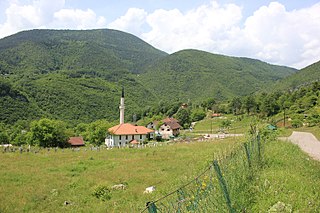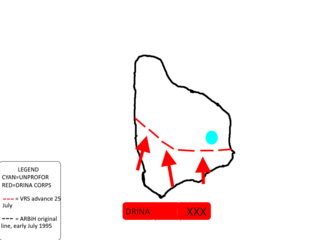
Naser Orić is a Bosnian former officer who commanded Army of the Republic of Bosnia and Herzegovina (ARBiH) forces in the Srebrenica enclave in eastern Bosnia surrounded by Bosnian Serb forces, during the Bosnian War.

The Bosnian War was an international armed conflict that took place in Bosnia and Herzegovina between 1992 and 1995. The war is commonly seen as having started on 6 April 1992, following several earlier violent incidents. It ended on 14 December 1995 when the Dayton Accords were signed. The main belligerents were the forces of the Republic of Bosnia and Herzegovina, the Republic of Herzeg-Bosnia, and the Republika Srpska, the latter two entities being proto-states led and supplied by Croatia and Serbia, respectively.

The Srebrenica massacre, also known as the Srebrenica genocide, was the July 1995 genocidal killing of more than 8,000 Bosniak Muslim men and boys in and around the town of Srebrenica during the Bosnian War. It was mainly perpetrated by units of the Bosnian Serb Army of Republika Srpska under Ratko Mladić, though the Serb paramilitary unit Scorpions also participated. The massacre was the first legally recognised genocide in Europe since the end of World War II.

The Bosnian genocide took place during the Bosnian War of 1992–1995 and included both the Srebrenica massacre and the wider crimes against humanity and ethnic cleansing campaign perpetrated throughout areas controlled by the Army of Republika Srpska (VRS). The events in Srebrenica in 1995 included the killing of more than 8,000 Bosniak men and boys, as well as the mass expulsion of another 25000–30000 Bosniak civilians by VRS units under the command of General Ratko Mladić.

Republika Srpska was a self-proclaimed statelet in Southeastern Europe under the control of the Army of Republika Srpska during the Bosnian War. It claimed to be a sovereign state, though this claim was only partially recognized by the Bosnian government in the Geneva agreement, the United Nations, and FR Yugoslavia. For the first six months of its existence, it was known as the Serbian Republic of Bosnia and Herzegovina.

Radislav Krstić is a former Bosnian Serb Deputy Commander and later Chief of Staff of the Drina Corps of the Army of Republika Srpska from October 1994 until 12 July 1995. He was promoted to the rank of major general in June 1995 and assumed command of the Drina Corps on 13 July 1995.

Žepa is a village located in the municipality of Rogatica, Republika Srpska, Bosnia and Herzegovina. As of 2013 census, it has a population of 133 inhabitants. It is situated northeast of Rogatica itself on the banks of short river with a same name, the Žepa river, which flows into the Drina river nearby, in a valley between the mountains Javor and Devetak.

Rape during the Bosnian War was a policy of mass systemic violence targeted against women. While men from all ethnic groups committed rape, the vast majority of rapes were perpetrated by Bosnian Serb forces of the Army of the Republika Srpska (VRS) and Serb paramilitary units, who used rape as an instrument of terror and a key tactic in their programme of ethnic cleansing. Estimates of the number of women raped during the war range between 10,000 and 50,000. Accurate numbers are difficult to establish and it is believed that the number of unreported cases is much higher than reported ones.

Radovan Karadžić is a Bosnian Serb politician who was convicted of genocide, crimes against humanity and war crimes by the International Criminal Tribunal for the former Yugoslavia (ICTY). He was the president of Republika Srpska during the Bosnian War.

The siege of Srebrenica was a three-year siege of the town of Srebrenica in eastern Bosnia and Herzegovina which lasted from April 1992 to July 1995 during the Bosnian War. Initially assaulted by the Yugoslav People's Army (JNA) and the Serbian Volunteer Guard (SDG), the town was encircled by the Army of Republika Srpska (VRS) in May 1992, starting a brutal siege which was to last for the majority of the Bosnian War. In June 1995, the commander of the Army of the Republic of Bosnia and Herzegovina (ARBiH) in the enclave, Naser Orić, left Srebrenica and fled to the town of Tuzla. He was subsequently replaced by his deputy, Major Ramiz Bećirović.

Ratko Mladić is a Bosnian Serb former military officer and convicted war criminal who led the Army of Republika Srpska (VRS) during the Yugoslav Wars. In 2017, he was found guilty of committing war crimes, crimes against humanity, and genocide by the International Criminal Tribunal for the former Yugoslavia (ICTY). He is serving a life sentence for these crimes in The Hague.

Operation Krivaja '95 was the codename of a military operation launched by the VRS against formations of the ARBIH in the UN enclave of Srebrenica. It was launched on 6 July 1995, and ended on 11 July 1995 with VRS capture of the city. The operation ended the three-year-long siege of the town and was followed by the Srebrenica massacre and Operation Stupčanica '95, which has been ruled a crime of genocide by international courts of law.

On 12 April 1993, the Army of Republika Srpska (VRS) launched an artillery attack against the town of Srebrenica. The attack left 56 dead, and 73 seriously wounded. The attack followed the suspension of cease-fire talks, and only hours before NATO would implement a no-fly zone in accordance to an UN resolution. VRS officials had previously told UNHCR representatives that unless the town surrendered within two days, the VRS would shell it.

Report about Case Srebrenica (the first part) was a controversial official report on the July 1995 Srebrenica massacre in eastern Bosnia and Herzegovina. It was prepared by Darko Trifunović and published by the Republika Srpska Government Bureau for Relations with the International Criminal Tribunal for the Former Yugoslavia (ICTY).

O-Gon Kwon is a South Korean jurist, best known for being one of the three judges in the trial of Slobodan Milošević. He also sat on the bench for the trial of former Bosnian Serb leader Radovan Karadžić.

Bosnian genocide denial is the act of denying the occurrence of the systematic genocide against the Bosniak Muslim population of Bosnia and Herzegovina, or asserting it did not occur in the manner or to the extent that has been established by the International Criminal Tribunal for the former Yugoslavia (ICTY) and the International Court of Justice (ICJ) through proceedings and judgments, and described by comprehensive scholarship.
Prisca Matimba Nyambe, SC is a Zambian judge who also sits on international tribunals. She is known for dissenting from the majority decisions of the International Criminal Tribunal for the former Yugoslavia (ICTY) judgements which convicted Ratko Mladić and Zdravko Tolimir of war crimes.

The Siege of Žepa was a three-year long siege of the small Bosnian town of Žepa which had lasted from the summer of 1992 – July 1995 during the Bosnian War. It was initially besieged by the Yugoslav People's Army (JNA) until it switched to the VRS. Throughout the siege, Žepa was part of the Srebrenica–Žepa link in eastern Bosnia. From April 1992 – February 1993, the ARBiH and the civilians of Žepa successfully resisted the Bosnian Serb army due to applying to guerrilla warfare.

Operation Stupčanica 95 was the codename for the military offensive launched by the "Drina Corps" of the VRS against the 285th Light Mountain Brigade. Launched on the 25 July 1995, it only took 1 day for the VRS to capture Žepa. The offensive ended the three-year long siege of the town and what followed was the deaths of 116 soldiers, 800 refugees, and the incorporation of Žepa into Republika Srpska. The offensive was launched 14 days after the fall of Srebrenica.

















